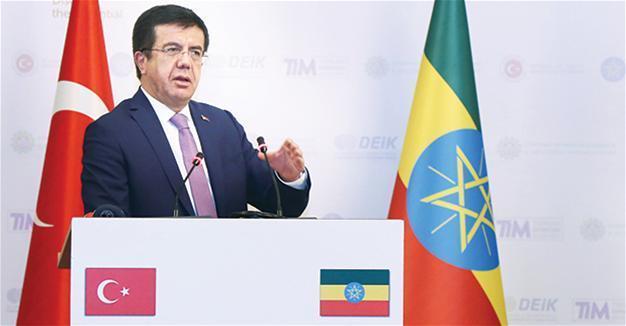Complete update in Customs Union deal to make additional 2 pct hike in Turkey’s GDP: Minister
ADDIS ABABA

AA photo
The modernization of the Customs Union deal with the European Union will increase Turkey’s gross domestic product (GDP) by 2 percent by 2030 in the best-case scenario, Economy Minister Nihat Zeybekci said, as reported by state-run Anadolu Agency.
Zeybekci said the ministry conducted impact assessment analyses on four different alternatives.
“The second alternative, which includes completely updating the existing Customs Union deal in all fields, namely agriculture, services and public procurement acquisitions, is the best option for us and the EU. According to the impact analyses in this scenario, there will be an additional 2 percent of contribution to Turkey’s GDP by 2030. A new era will begin for Turkey if this deal is fully applied in the future,” he told journalists on his way for an official visit to Ethiopia.
The European Commission said Dec. 21 that it asked the European Council for a mandate to launch talks with Turkey to modernize the existing EU-Turkey Customs Union. The upgrade of the EU-Turkey trade relation forms an essential part of the efforts made by the EU and Turkey to deepen their relations in key areas of joint interest identified at the EU-Turkey Summit of Nov. 29, 2015, and in the EU-Turkey statement of March 18, 2016.
“We believe that the related decision will be made in the first quarter of 2017. We do not think there will be any problems in line with our talks, although anything is possible,” he said.
He added that both Turkey and the EU asked independent institutions to make impact analyses, which were completed simultaneously.
Four alternatives
“We find the results positive for both sides. We made a presentation on four different alternatives to the cabinet. The first alternative includes updating the existing Customs Union deal, yet with around 50 percent of expansion only in the agriculture sector. The second alternative includes the complete modernization of the deal in all fields, including agriculture, services and public procurement acquisitions. In all these alternatives, we will have the right to take part in the decision-making processes and automatically become part of the free trade deals, which are signed with third parties. The third alternative stipulates the transition of the Customs Union deal into a comprehensive free trade agreement with both parties having the right to determine separate customs tariffs for each product. The fourth alternative is not to revise the existing deal, meaning that it will keep the deal to include industry products only,” Zeybekci said.
“The best alternative for both of us is the second alternative. We will focus on this option, although the other options will not be out of table,” he added.
The realization of the second option will also lead an additional 24.5 percent of increase in exports and 23 percent of increase in imports, he said, while adding that the modernization works should be completed by 2018 at most.
Turkey is the EU’s fifth largest partner in trade in goods. The value of bilateral trade in goods has increased more than fourfold since 1996 and currently amounts to 140 billion euros annually. The EU has a positive balance of 17 billion euros. For Turkey, the EU is the most important trading partner, representing 41 percent of Turkey’s global trade. Meanwhile, two thirds of foreign direct investment in Turkey currently comes from the EU.
